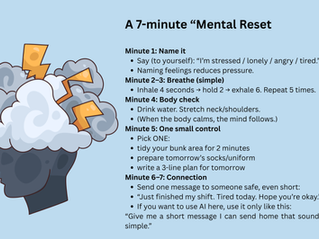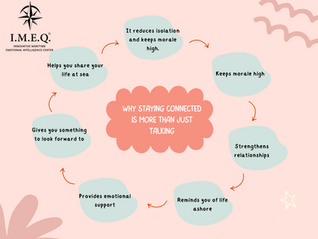Building Friendships Onboard: Making Connections in a Challenging Environment
- IMEQ CENTER

- Mar 20, 2025
- 3 min read
Life at sea is a unique experience. It comes with adventure, hard work, and the challenge of being away from home for long periods. For seafarers, forming friendships onboard isn’t always easy—long shifts, a demanding environment, and cultural differences can make socializing difficult. But strong relationships with crewmates can make ship life more enjoyable, reduce stress, and even improve teamwork. Here’s how you can build meaningful connections while working at sea.

Challenges of Making Friends Onboard
Demanding Work Schedules
Working 10- to 12-hour shifts leaves little time for socializing. After a long shift, many crew members just want to rest.
Example: If your shift ends late, try catching up with a small group over a quick coffee before heading to bed. Even a 10-minute chat can help build friendships over time.
Cultural and Language Barriers
Crews are often multicultural, with different languages and customs. Misunderstandings can happen, and communication styles may differ.
Example: If you don’t speak the same language fluently, use gestures, simple words, or translation apps to communicate. A shared activity, like playing cards, can help break language barriers.
Lack of Privacy and Personal Space
Sharing cabins and working in close quarters can sometimes lead to tension or frustration.
Example: If your roommate needs quiet time after work, use headphones to watch a movie or step outside to make calls.
Homesickness and Stress
Missing family and dealing with the pressures of the job can make seafarers withdraw from social interactions.
Example: If a crewmate seems withdrawn, invite them for a walk on deck or share a favorite snack from home—it could lift their spirits.
Ways to Build Strong Friendships at Sea
Start with Small Talk
A simple “How’s your day?” can open the door to friendship.
Ask about a crewmate’s background, favorite foods, hobbies, or experiences at sea.
Example: If someone mentions they like fishing, ask about their best catch or share a fishing story of your own.
Be a Good Listener and Offer Support
Pay attention when someone shares a story or concern. Sometimes, just listening can make a big difference.
Acknowledge and respect different emotions—everyone faces tough days.
Example: If a fellow crew member shares that they’re missing their child’s birthday, suggest making a short video message to send home.
Join Group Activities
Participate in movie nights, card games, karaoke, or friendly competitions.
Join fitness activities—working out together can be a great way to bond.
Example: Organize a friendly football match on deck or set up a mini table tennis tournament.
Celebrate birthdays and milestones together. Small celebrations can create a sense of community.
Example: If it’s someone’s birthday, gather a small group and surprise them with a simple song or a shared treat from the galley.
Show Respect and Reliability
Be dependable at work—people trust those who keep their word and do their part.
Respect personal space; some crewmates may need alone time after work.
Avoid gossip and unnecessary conflicts—trust takes time to build but can be lost quickly.
Example: If you promise to cover a short shift while a crewmate makes an important call home, make sure you follow through.
Communicate Openly and Resolve Issues Calmly
Misunderstandings happen—address them with honesty and patience.
If tensions arise, talk things out instead of letting issues build up.
Example: If a roommate is being too loud while you’re trying to rest, politely ask them to lower the volume rather than ignoring it and feeling frustrated.
Offer Help and Be Kind
Small acts of kindness—sharing snacks, helping with a task, or offering a seat—go a long way.
Check in on crewmates, especially if they seem down or withdrawn.
Example: If a colleague is struggling with heavy lifting, offer a hand without being asked. It shows teamwork and builds trust.
A little laughter can break the ice—don’t be afraid to share a joke or funny story.
Example: Share a funny sea story or a humorous experience from your home country to lighten the mood.
Finding the Right Friendships
Not everyone will become your best friend, and that’s okay. Focus on connecting with those who:
Stay positive under pressure.
Show kindness and respect to others.
Have common interests or values that align with yours.
Example: If you both enjoy playing guitar, suggest a jam session during downtime.
Final Thoughts
Making friends at sea takes effort, but it’s worth it. Friendships onboard can improve morale, reduce stress, and make long contracts feel shorter. By staying open, respectful, and engaged, you can create meaningful connections that make ship life better for yourself and those around you. A good crew isn’t just about working together—it’s about supporting each other and making life at sea a little easier.
Io Baltatzi,
Msc Psychologist
IMEQ TEAM





































































































Comments